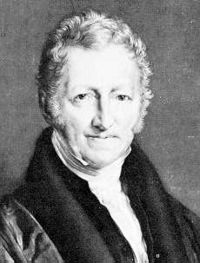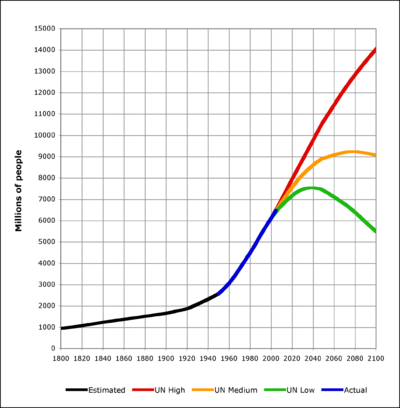
Albert Bartlett
Encyclopedia
Albert Allen Bartlett is an emeritus Professor of Physics at the University of Colorado at Boulder
, USA. Professor Bartlett has lectured over 1,600 times since September, 1969 on Arithmetic, Population, and Energy. Bartlett believes that sustainable growth is a contradiction
, since modest annual percentage population increases will inevitably equate to huge exponential growth over sustained periods of time. He therefore regards human overpopulation as "The Greatest Challenge" facing humanity.
(1944) and his M.A. (1948) and Ph.D. (1951) degrees in physics are from Harvard University
. In 1978 he was national president of the American Association of Physics Teachers
. He is a Fellow
of the American Physical Society
and of the American Association for the Advancement of Science
. In 1969 and 1970 he served two terms as the elected Chair of the four-campus Faculty Council of the University of Colorado.



 Professor Bartlett often explains how sustainable growth is a contradiction
Professor Bartlett often explains how sustainable growth is a contradiction
. His view is based on the fact that a modest percentage growth can equate to huge escalations over short periods of time.
Bartlett argues that, over time, compound growth can yield enormous increases. For example, an investor earning a constant annual 7% return on their investment would find their capital doubling within 10 years. But the same exponential power, so advantageous to patient investors, may be potentially calamitous when applied to human population. A population of 10,000 individuals, if it were to grow at a constant rate of 7% per annum, would reach a population size of 10 million after 100 years.
He regards overpopulation
as "The Greatest Challenge" facing humanity, and promotes sustainable living
. Bartlett opposes the cornucopian
school of thought (as advocated by people such as Julian Lincoln Simon
), and refers to it as "The New Flat Earth Society"
J. B. Calvert (1999) has proposed that Bartlett's law will result in the exhaustion of petrochemical resources due to the exponential growth
of the world population
in line with the Malthusian Growth Model
).
Bartlett has made two notable statements relating to sustainability:
and his Great Challenge:
University of Colorado at Boulder
The University of Colorado Boulder is a public research university located in Boulder, Colorado...
, USA. Professor Bartlett has lectured over 1,600 times since September, 1969 on Arithmetic, Population, and Energy. Bartlett believes that sustainable growth is a contradiction
Contradiction
In classical logic, a contradiction consists of a logical incompatibility between two or more propositions. It occurs when the propositions, taken together, yield two conclusions which form the logical, usually opposite inversions of each other...
, since modest annual percentage population increases will inevitably equate to huge exponential growth over sustained periods of time. He therefore regards human overpopulation as "The Greatest Challenge" facing humanity.
Career
Bartlett joined the faculty of the University of Colorado in Boulder in September 1950. His B.A. degree in physics is from Colgate UniversityColgate University
Colgate University is a private liberal arts college in Hamilton, New York, USA. The school was founded in 1819 as a Baptist seminary and later became non-denominational. It is named for the Colgate family who greatly contributed to the university's endowment in the 19th century.Colgate has 52...
(1944) and his M.A. (1948) and Ph.D. (1951) degrees in physics are from Harvard University
Harvard University
Harvard University is a private Ivy League university located in Cambridge, Massachusetts, United States, established in 1636 by the Massachusetts legislature. Harvard is the oldest institution of higher learning in the United States and the first corporation chartered in the country...
. In 1978 he was national president of the American Association of Physics Teachers
American Association of Physics Teachers
The American Association of Physics Teachers was founded in 1930 for the purpose of "dissemination of knowledge of physics, particularly by way of teaching." There are more than 10,000 members that reside in over 30 countries. AAPT publications include two peer-reviewed journals, the American...
. He is a Fellow
Research fellow
The title of research fellow is used to denote a research position at a university or similar institution, usually for academic staff or faculty members. A research fellow may act either as an independent investigator or under the supervision of a principal investigator...
of the American Physical Society
American Physical Society
The American Physical Society is the world's second largest organization of physicists, behind the Deutsche Physikalische Gesellschaft. The Society publishes more than a dozen scientific journals, including the world renowned Physical Review and Physical Review Letters, and organizes more than 20...
and of the American Association for the Advancement of Science
American Association for the Advancement of Science
The American Association for the Advancement of Science is an international non-profit organization with the stated goals of promoting cooperation among scientists, defending scientific freedom, encouraging scientific responsibility, and supporting scientific education and science outreach for the...
. In 1969 and 1970 he served two terms as the elected Chair of the four-campus Faculty Council of the University of Colorado.
Views on population growth




Contradiction
In classical logic, a contradiction consists of a logical incompatibility between two or more propositions. It occurs when the propositions, taken together, yield two conclusions which form the logical, usually opposite inversions of each other...
. His view is based on the fact that a modest percentage growth can equate to huge escalations over short periods of time.
Bartlett argues that, over time, compound growth can yield enormous increases. For example, an investor earning a constant annual 7% return on their investment would find their capital doubling within 10 years. But the same exponential power, so advantageous to patient investors, may be potentially calamitous when applied to human population. A population of 10,000 individuals, if it were to grow at a constant rate of 7% per annum, would reach a population size of 10 million after 100 years.
He regards overpopulation
Overpopulation
Overpopulation is a condition where an organism's numbers exceed the carrying capacity of its habitat. The term often refers to the relationship between the human population and its environment, the Earth...
as "The Greatest Challenge" facing humanity, and promotes sustainable living
Sustainable living
Sustainable living is a lifestyle that attempts to reduce an individual's or society's use of the Earth's natural resources and his/her own resources. Practitioners of sustainable living often attempt to reduce their carbon footprint by altering methods of transportation, energy consumption and diet...
. Bartlett opposes the cornucopian
Cornucopian
A cornucopian is a futurist who believes that continued progress and provision of material items for mankind can be met by similarly continued advances in technology...
school of thought (as advocated by people such as Julian Lincoln Simon
Julian Lincoln Simon
Julian Lincoln Simon was a professor of business administration at the University of Maryland and a Senior Fellow at the Cato Institute at the time of his death, after previously serving as a longtime business professor at the University of Illinois at Urbana-Champaign.Simon wrote many books and...
), and refers to it as "The New Flat Earth Society"
J. B. Calvert (1999) has proposed that Bartlett's law will result in the exhaustion of petrochemical resources due to the exponential growth
Exponential growth
Exponential growth occurs when the growth rate of a mathematical function is proportional to the function's current value...
of the world population
World population
The world population is the total number of living humans on the planet Earth. As of today, it is estimated to be billion by the United States Census Bureau...
in line with the Malthusian Growth Model
Malthusian growth model
The Malthusian growth model, sometimes called the simple exponential growth model, is essentially exponential growth based on a constant rate of compound interest...
).
Bartlett has made two notable statements relating to sustainability:
"The greatest shortcoming of the human race is our inability to understand the exponential function."
and his Great Challenge:
"Can you think of any problem in any area of human endeavor on any scale, from microscopic to global, whose long-term solution is in any demonstrable way aided, assisted, or advanced by further increases in population, locally, nationally, or globally?"
Books
- The Essential Exponential For the Future of Our Planet a collection of essays by Professor Bartlett (2004). Center for Science, Mathematics and Computer Education, University of Nebraska-Lincoln. ISBN 0-9758973-0-6
See also
- Exponential growthExponential growthExponential growth occurs when the growth rate of a mathematical function is proportional to the function's current value...
- Thomas Robert Malthus - the originator of the Malthusian catastropheMalthusian catastropheA Malthusian catastrophe was originally foreseen to be a forced return to subsistence-level conditions once population growth had outpaced agricultural production...
argument - Peak oilPeak oilPeak oil is the point in time when the maximum rate of global petroleum extraction is reached, after which the rate of production enters terminal decline. This concept is based on the observed production rates of individual oil wells, projected reserves and the combined production rate of a field...
- M. King HubbertM. King HubbertMarion King Hubbert was a geoscientist who worked at the Shell research lab in Houston, Texas. He made several important contributions to geology, geophysics, and petroleum geology, most notably the Hubbert curve and Hubbert peak theory , with important political ramifications. He was often...
, author of the Hubbert Curve.
External links
- Professor Bartlett's website contains background, articles, book "The Essential Exponential", and links to his talk, "Arithmetic, Population, and Energy". Retrieved July 2011
- Professor Bartlett's page at Colorado University Retrieved July 2011
- Biography of Dr Bartlett Retrieved July 2011
- "Arithmetic, Population, and Energy" by Professor Albert Bartlett Free audio and video 57 minute lecture. Retrieved July 2011
- "Arithmetic, Population, and Energy" by Professor Albert Bartlett Text of lecture (extracts). Retrieved July 2011
- Analysis of Bartlett's "Arithmetic, Population, and Energy" presentation - Exponentialist website. Retrieved July 2011
- Is There a Population Problem? Ecofuture website. Retrieved July 2011
- The Massive Movement to Marginalise the Modern Malthusian Message article by Professor Bartlett. Retrieved July 2011
- Thoughts on Long-term Energy Supplies - Scientists and the Silent Lie article on energy and population in Physics Today (2004). Retrieved July 2011
- Clean Coal Technology Speech by Andrew McNamaraAndrew McNamaraAndrew Ian McNamara is an Australian politician. He was a Labor member of the Queensland Legislative Assembly from 2001 to 2009, representing the district of Hervey Bay...
MP on clean coal and report by Professor Bartlett - Arithmetic, Population & Energy, Part I @YouTube.com (Part 1 of 8), (parts 2-4 are linked). Retrieved July 2011
- Arithmetic, Population & Energy, Part II @YouTube.com (Part 5 of 8), (parts 6-8 are linked). Retrieved July 2011
- Arithmetic, Population & Energy @Google (entire video). Retrieved July 2011
- Lecture by Professor Bartlett about the exponential function @Vimeo. Retrieved July 2011
- BLIND SPOT, Documentary, Population & Energy. Retrieved July 2011

